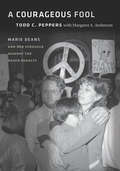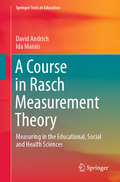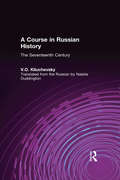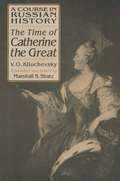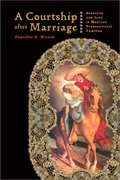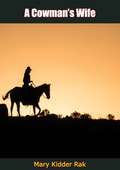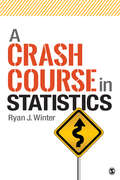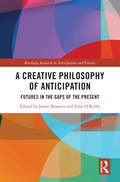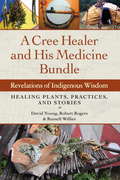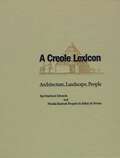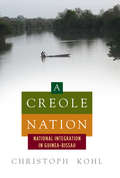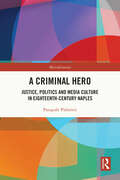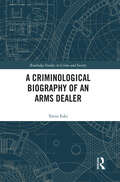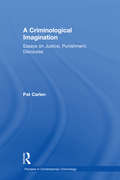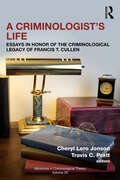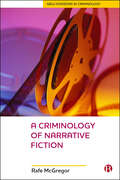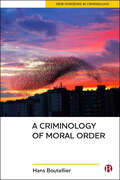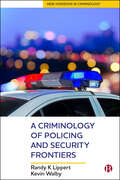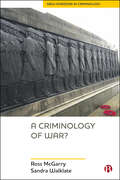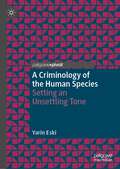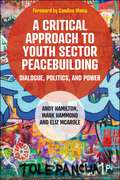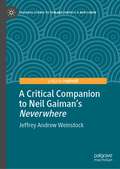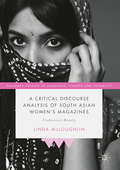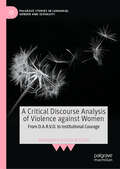- Table View
- List View
A Courageous Fool: Marie Deans and Her Struggle against the Death Penalty
by Todd C. Peppers Margaret A. AndersonThere have been many heroes and victims in the battle to abolish the death penalty, and Marie Deans fits into both of those categories. A South Carolina native who yearned to be a fiction writer, Marie was thrust by a combination of circumstances--including the murder of her beloved mother-in-law--into a world much stranger than fiction, a world in which minorities and the poor were selected to be sacrificed to what Supreme Court Justice Harry Blackmun called the "machinery of death." Marie found herself fighting to bring justice to the legal process and to bring humanity not only to prisoners on death row but to the guards and wardens as well. During Marie's time as a death penalty opponent in South Carolina and Virginia, she experienced the highs of helping exonerate the innocent and the lows of standing death watch in the death house with thirty-four condemned men.
A Course in Rasch Measurement Theory: Measuring in the Educational, Social and Health Sciences (Springer Texts in Education)
by David Andrich Ida MaraisThis book applies Rasch measurement theory to the fields of education, psychology, sociology, marketing and health outcomes in order to measure various social constructs. The chief focus is on first principles of both the theory and its applications. Because software is readily available to carry out analyses of real data, numerous small examples are provided in the book. The software used in these examples, and which is helpful in working through the text, is RUMM2030 (Rasch unidimensional models for measurement).The book’s main goals are to equip researchers with the confidence they need in order to be in control of the analysis and interpretation of data, and to make professional rather than primarily statistical decisions mechanically. Because statistical principles are necessarily involved, reviews of the requisite statistics are provided in the Appendix.The content is based on courses that have been taught both online and in intensive form for over two decades. Although first principles are emphasised, much of the book is based on research conducted by the two authors and their colleagues.
A Course in Russian History: The Seventeenth Century
by V.O. KliuchevskiiThis work by the great 19th-century historian is available once again in an acclaimed 1968 translation that conveys the beauty of Kliuchevsky's language and the power of his ideas. In this volume, Kliuchevsky untangles the confused events of the Time of Troubles and the emergence of the Romanov dynasty, and develops his interpretation of the century as prologue to the Petrine reforms. He dramatically underlines the cultural divide between old Russia and the emergent autocracy and the strangely ambivalent relationship between Russia and the West.
A Course in Russian History: The Time Of Catherine The Great
by Marshall S. Shatz Vasili O. KliuchevskyIn this newly-translated excerpt from his five-volume "Course", Kliuchevsky (1841-1911) provides a colourful description of Russian court life in the 18th century, a dramatic narrative of the coup d'etat that brought Catherine II to power, a portrait of the empress herself, and an analysis of her foreign conquests and her major internal initiatives. While Kliuchevsky is critical of Catherine, he draws upon her memoirs and other writings and the accounts of her contemporaries to achieve a well-rounded and deeply human analysis of her character and personality. It is an extraordinary act of historical re-creation of the sort that brought Kliuchevsky such renown in his own time, and it remains so lifelike that it fairly leaps off the page. Kliuchevsky's examination of Western influence in Catherine's reign leads him to questions that were of urgent significance for Russia's development in his own day, and have remained so ever since: how to use Western ideas and practices to improve and enrich Russian life, without turning them into idle fashions or political bludgeons, and where to find the social leadership capable of performing such a delicate task.
A Courtship after Marriage: Sexuality and Love in Mexican Transnational Families
by Jennifer S. HirschThis is one of the very first volumes exploring the lives, private or otherwise, of migrants in the American Southeast. Given recent census results, which showed enormous growth in Mexican migration to the Southeastern US, this provides an intimate look at a group of our new neighbors about whom very little is known.
A Cowman’s Wife
by Mary Kidder RakA Cowman’s Wife is the true account of the author’s experience as co-owner of Old Camp Rucker Ranch, a 22,000 acre spread north of Douglas, Arizona that she purchased with her husband in 1919. It chronicles a woman’s view of cattle ranching in Northern Arizona, with all the hardships of the 1920’s and 1930’s, Native Americans, Mexicans, wolves, and horse thieves. She also tells of the pleasures of ranch life: spectacular sunsets, mountain scenery, camaraderie of ranch people, and all-night dances at neighborhood school house.A wonderful escapist read!
A Crash Course in Statistics
by Ryan J. WinterA Crash Course in Statistics is a short introduction to key statistical methods including descriptive statistics, one-way and two-way ANOVA, the t-test, and Chi Square. Each of the five chapters provides an overview of each method, and then walks readers through a relevant example, using SPSS to highlight how to run the statistics and how to write up the results in APA style. Each chapter ends with a self-quiz so that readers can assess their understanding of each statistical concept. This "crash course" supplement is a must-have statistics refresher for students taking research methods classes; a handy additional reference for introductory statistics students; and a guide for anyone who needs to be a consumer of statistics.
A Crash Course in Statistics
by Ryan J. WinterA Crash Course in Statistics is a short introduction to key statistical methods including descriptive statistics, one-way and two-way ANOVA, the t-test, and Chi Square. Each of the five chapters provides an overview of each method, and then walks readers through a relevant example, using SPSS to highlight how to run the statistics and how to write up the results in APA style. Each chapter ends with a self-quiz so that readers can assess their understanding of each statistical concept. This "crash course" supplement is a must-have statistics refresher for students taking research methods classes; a handy additional reference for introductory statistics students; and a guide for anyone who needs to be a consumer of statistics.
A Creative Philosophy of Anticipation: Futures in the Gaps of the Present (Routledge Research in Anticipation and Futures)
by Jamie Brassett and John O’ReillyThis edited collection highlights the valuable ontological and creative insights gathered from anticipation studies, which orients itself to the future in order to recreate the present. The gathered essays engage with many writers from speculative metaphysics to poetic philosophy, ancient writing systems to the fringes of pataphysics. The book situates itself as a creative intervention in and with various thinkers, designers, artists, scientists and poets to offer insight into ways of anticipating. It brings together philosophical practices for which creativity is both a fundamental area of consideration and a mode of working, a characterization of recent Continental Philosophy which takes a departure from traditional futures studies thinking. This book will be of interest to scholars and research in futures studies, anticipation, philosophy, creative practice and theories about creative practice, as well as the intersections between philosophy, creativity and business.
A Cree Healer and His Medicine Bundle
by David Young Robert Rogers Russell WillierWith the rise of urban living and the digital age, many North American healers are recognizing that traditional medicinal knowledge must be recorded before being lost with its elders. A Cree Healer and His Medicine Bundle is a historic document, including nearly 200 color photos and maps, in that it is the first in which a native healer has agreed to open his medicine bundle to share in writing his repertoire of herbal medicines and where they are found. Providing information on and photos of medicinal plants and where to harvest them, anthropologist David E. Young and botanist Robert D. Rogers chronicle the life, beliefs, and healing practices of Medicine Man Russell Willier in his native Alberta, Canada. Despite being criticized for sharing his knowledge, Willier later found support in other healers as they began to realize the danger that much of their traditional practices could die out with them. With Young and Rogers, Willier offers his practices here for future generations. At once a study and a guide, A Cree Healer and His Medicine Bundle touches on how indigenous healing practices can be used to complement mainstream medicine, improve the treatment of chronic diseases, and lower the cost of healthcare. The authors discuss how mining, agriculture, and forestry are threatening the continued existence of valuable wild medicinal plants and the role of alternative healers in a modern health care system. Sure to be of interest to ethnobotanists, medicine hunters, naturopaths, complementary and alternative health practitioners, ethnologists, anthropologists, and academics, this book will also find an audience with those interested in indigenous cultures and traditions.
A Creole Lexicon: Architecture, Landscape, People
by Jay Edwards Nicolas Kariouk VertonThroughout Louisiana's colonial and postcolonial periods, there evolved a highly specialized vocabulary for describing the region's buildings, people, and cultural landscapes. This creolized language -- a unique combination of localisms and words borrowed from French, Spanish, English, Indian, and Caribbean sources -- developed to suit the multiethnic needs of settlers, planters, explorers, builders, surveyors, and government officials. Today, this historic vernacular is often opaque to historians, architects, attorneys, geographers, scholars, and the general public who need to understand its meanings. With A Creole Lexicon, Jay Edwards and Nicolas Kariouk provide a highly organized resource for its recovery. Here are definitions for thousands of previously lost or misapplied terms, including watercraft and land vehicles, furniture, housetypes unique to Louisiana, people, and social categories. Drawn directly from travelers' accounts, historic maps, and legal documents, the volume's copious entries document what would actually have been heard and seen by the peoples of the Louisiana territory. Newly produced diagrams and drawings as well as reproductions of original eighteenth- and nineteenth-century documents and Historic American Buildings Surveys enhance understanding. Sixteen subject indexes list equivalent English words for easy access to appropriate Creole translations. A Creole Lexicon is an invaluable resource for exploring and preserving Louisiana's cultural heritage.
A Creole Nation: National Integration in Guinea-Bissau
by Christoph KohlDespite high degrees of cultural and ethnic diversity as well as prevailing political instability, Guinea-Bissau’s population has developed a strong sense of national belonging. By examining both contemporary and historical perspectives, A Creole Nation explores how creole identity, culture, and political leaders have influenced postcolonial nation-building processes in Guinea-Bissau, and the ways in which the phenomenon of cultural creolization results in the emergence of new identities.
A Criminal Hero: Justice, Politics and Media Culture in Eighteenth-Century Naples (ISSN)
by Pasquale PalmieriIn the spring of 1757, the Augustinian friar Leopoldo di San Pasquale was tried in Naples by the hierarchies of his own religious order on charges of financial fraud, heresy, and sexual immorality. He responded by accusing the heads of the convent of subjecting him to a series of inhuman cruelties, claiming to have been "buried alive". While waiting for a final judgment (it was pronounced seven years later, in 1764), the trial of Leopoldo di San Pasquale became a cultural phenomenon unlike any witnessed before in Naples. Cumulatively, reactions to the trial, both during and after it, broke the boundaries separating chronicle and literary fiction, engaged people’s faculties of reason and emotion, and ultimately transformed Leopoldo into a public spectacle—or what we might call today a “celebrity.”Focusing on the scandalous affair of the "buried alive", this book shows how the governing authorities in Naples managed the development of news and stories around current events through their systems of courts and bureaucracies. It also aims to demonstrate how, just as importantly, consumers played an increasing in the spread of information, as means to political empowerment. The sources analyzed call for a microhistorical analysis, as well as for an interdisciplinary discussion with media studies at its conceptual core.A Criminal Hero will appeal to students and scholars alike interested in microhistory, cultural history, media history, history of literature, social and political history, with a focus on the eighteenth century.
A Criminological Biography of an Arms Dealer (Routledge Studies in Crime and Society)
by Yarin EskiFor many, the arms trade and its dealers are the root cause of regional wars and global terrorism. In both public and academic debates, arms dealers are considered immoral as they profit from conflict, due to their key position in the international arms trading business. Nevertheless, there seems to be little to no interest in the personal lives of those actively involved. In his criminological biography of a licensed arms dealer, Yarin Eski provides an in-depth, interdisciplinary approach to and understanding of the global arms trade, revealing a deep insider view placed in a wider sociocultural context. From early discussions about childhood and career choices, to reflections on becoming and being an arms trader, Eski offers a methodologically embedded approach and advances biographical writing in the field of Criminology. It is a unique and thought-provoking contribution to the fields of criminology, ethnography, sociology, critical security studies, policing studies, war studies and international politics and offers an unparalleled insight from within.
A Criminological Imagination: Essays on Justice, Punishment, Discourse (Pioneers In Contemporary Criminology Ser.)
by Pat CarlenA Criminological Imagination contains a selection of key articles from Pat Carlen's research studies of magistrates' courts and women's imprisonment together with a range of other articles on social control, discourse analysis, ideology, punishment, criminology and critique. They are all informed by an assumption that while criminal justice must remain imaginary in societies based upon unequal and exploitative social relations, one task of a criminological imagination might be to suggest why this is so, and how things could be otherwise. This is an invaluable collection for anyone interested in crime, justice and injustice and the social, political and academic contexts in which knowledge of them is constructed.
A Criminologist’s Life: Essays in Honor of the Criminological Legacy of Francis T. Cullen (Advances in Criminological Theory)
by Travis C. Pratt Cheryl Lero JonsonA Criminologist’s Life: Essays in Honor of the Criminological Legacy of Francis T. Cullen honors the vast scholarly contributions of Francis T. "Frank" Cullen as well as the immeasurable influence that he has had on the field for over 40 years.With over 500 publications to his name and more than 67,000 citations to his work, Frank Cullen has left an indelible mark on the fields of criminology and criminal justice. Although best known for his work on rehabilitation and criminological theory, Frank also has profusely published in and shaped the areas of white-collar crime, the use of meta-analytic techniques to organize knowledge, the sexual victimization of college women, and public opinion on crime and punishment. However, Frank’s legacy on the field is not limited to his scholarly contributions: He has served as a mentor to countless students, colleagues, and others in the field, helping support and guide the next generation of scholars. Thus, the current volume is organized to recognize both his scholarly work and mentoring, as well as to provide an opportunity for Frank to reflect on his career "in his own words."The result is a collection of essays from Frank’s former students, colleagues, and friends written to pay homage to the more than 40 years of work he has done to advance criminological knowledge and shape the field.
A Criminology Of Narrative Fiction (New Horizons in Criminology)
by Rafe McGregorCriminology has been reluctant to embrace fictional narratives as a tool for understanding, explaining and reducing crime and social harm. In this philosophical enquiry, McGregor uses examples from films, television, novels and graphic novels to demonstrate the extensive criminological potential of fiction around the world. Building on previous studies of non-fiction narratives, the book is the first to explore the ways criminological fiction provides knowledge of the causes of crime and social harm. For academics, practitioners and students, this is an engaging and thought-provoking critical analysis that establishes a bold new theory of criminological fiction.
A Criminology of Moral Order (New Horizons in Criminology)
by Hans BoutellierMoral order is disturbed by criminal events. However, in a secularized and networked society a common moral ground is increasingly hard to find. People feel confused about the bigger issues of our time such as crime, anti-social behaviour, Islamist radicalism, sexual harassment and populism. Traditionally, issues around morality have been neglected by criminologists. Through theory, case studies and discussion, this book sheds a new and topical light on these concerns. Using the moral perspective, Boutellier bridges the gap between people’s emotional opinions on crime, and criminologists' rationalized answers to questions of crime and security.
A Criminology of Policing and Security Frontiers (New Horizons in Criminology)
by Kevin Walby Randy K LippertPolicing and security provision are subjects central to criminology. Yet there are newer and neglected forms that are currently unscrutinised. By examining the work of community safety officers, ambassador patrols, conservation officers, and private police foundations, who operate on and are animated by a frontier, this book reveals why criminological inquiry must reach beyond traditional conceptual and methodological boundaries in the 21st century. Including novel case studies, this multi-disciplinary and international book assembles a rich collection of policing and security frontiers both geographical (e.g. the margins of cities) and conceptual (dispersion and credentialism) not seen or acknowledged previously.
A Criminology of War? (New Horizons in Criminology)
by Sandra Walklate Ross McGarryIn recent years, the academic study of ‘war’ has gained renewed popularity in criminology. This book illustrates its long-standing engagement with this social phenomenon within the discipline. Foregrounding established criminological work addressing war and connecting it to a wide range of extant sociological literature, the authors present and further develop theoretical and conceptual ways of thinking critically about war. Providing a critique of mainstream criminology, the authors question whether a ‘criminology of war’ is possible, and if so, how this seemingly ‘new horizon’ of the discipline might be usefully informed by sociology.
A Criminology of the Human Species: Setting an Unsettling Tone (Palgrave Studies in Green Criminology)
by Yarin EskiThe book sketches out how the criminological lens could be used in the climate change debate around possible human extinction. It explores the extent to which the human species can be considered deviant in relation to other species of the contemporary biosphere, as humans seem to be the only species on Earth that does not live in natural balance with their environment (anymore). It discusses several unsettling topics in the public debate on climate change, specifically the taboo of how humans may not survive the ongoing climate change. It includes chapters on the Earth’s history of mass-extinctions, the global state of denial including toward the possibility that the human species could go extinct, and it considers humans' future as a deviant, fatal species outside of Earth, in outer-space, possibly on other planets. It puts forward and enriches the critical criminological tradition by conceptualizing and setting an unsettling tone within criminology and criminological research on the human species and our extinction, by daring criminologists (and victimologists) to ponder and seek empirical answers to controversial imaginations and questions about our possible extinction.
A Critical Approach to Youth Sector Peacebuilding: Dialogue, Politics, and Power
by Mark Hammond Andy Hamilton Eliz McArdleUsing Northern Ireland as a compelling case study, this book offers a critique of peacebuilding approaches with young people in contested societies. In the north of Ireland, the spectre of murderous violence is increasingly distant for peace-agreement generations. However, legacies stemming from the 30 years of protracted conflict are ever-present in young people’s segregated lives. This book presents four distinctive viewpoints that inform contemporary peacebuilding work with young people, revealing divergent purposes and conflicting aspirations. Offering a new model to understand peacebuilding, the authors urge peacebuilding communities around the globe to embrace an increasingly politicising and participative youth peace praxis.
A Critical Companion to Neil Gaiman's "Neverwhere" (Palgrave Science Fiction and Fantasy: A New Canon)
by Jeffrey Andrew WeinstockFantasy author Neil Gaiman’s 1996 novel Neverwhere is not just a marvelous self-contained novel, but a terrifically useful text for introducing students to fantasy as a genre and issues of adaptation. Jeffrey Andrew Weinstock’s briskly written A Critical Companion to Neil Gaiman’s Neverwhere offers an introduction to the work; situates it in relation to the fantasy genre, with attention in particular to the Hero’s Journey, urban fantasy, word play, social critique, and contemporary fantasy trends; and explores it as a case study in transmedial adaptation. The study ends with an interview with Neil Gaiman that addresses the novel and a bibliography of scholarly works on Gaiman.
A Critical Discourse Analysis of South Asian Women's Magazines: Undercover Beauty (Palgrave Studies in Language, Gender and Sexuality)
by Linda McloughlinThis intriguing book applies Critical Discourse Analysis to a range of South Asian women’s lifestyle magazines, exposing the disconnection between the magazines’ representations of South Asian women and the lived realities of the target audience. The author challenges the notion that discourses of freedom and choice employed by women’s magazines are emancipatory, demonstrating instead that the version of feminism on offer is a commodified form which accords with the commercial aims of the publications. McLoughlin demonstrates that whilst British magazines present women in the East as the exotic and culturally superior ‘Other’, women in India are encouraged to emulate Western women to signify their engagement with globalization and modernity. She uses data from focus groups carried out in both countries to illustrate the interpretive frameworks and multivocality of participants’ attitudes, experiences and beliefs. This thought-provoking book will appeal to students and researchers of Language and Linguistics, Women’s Studies, Anthropology, Sociology, Media, Communications and Cultural Studies.
A Critical Discourse Analysis of Violence against Women: From D.A.R.V.O. to Institutional Courage (Palgrave Studies in Language, Gender and Sexuality)
by Giuseppina Scotto di CarloThis book presents a critical analysis of the language surrounding Violence against Women and Girls (VAWG), demonstrating how discourse can both sustain harm and serve as a catalyst for healing and change. Grounded in Critical Discourse Analysis (CDA), it examines the &“DARVO&” tactic—Deny, Attack, Reverse Victim and Offender (Freyd, 1997)—a manipulative strategy used by perpetrators to evade accountability, silence survivors, and reinforce a culture of victim-blaming. Through detailed case studies, the book uncovers the broader societal structures that enable and normalise these behaviours. To counteract these harmful dynamics, the author introduces the concept of &“institutional courage&” (Freyd, 1997), providing a framework for institutions to respond more effectively and empathetically to VAWG. Ultimately, the book advocates for a shift in both individual and institutional responses, urging a collective commitment to challenge DARVO and adopt institutional courage in the fight against VAWG. This work will be of particular interest to scholars, practitioners, and students across Linguistics, Women&’s and Gender Studies, Sociology, and Institutional Discourse.
